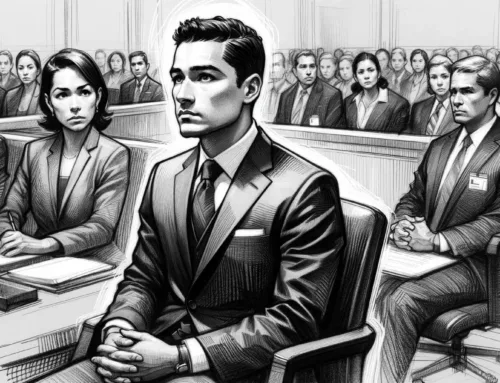It is natural for people to want to believe that the world is a fair and just place and that people who are accused of crimes are guilty. This may lead people to automatically assume that someone is guilty simply because they have been accused. For example, people may assume that someone is guilty if they have only heard one side of the story or have been exposed to biased or incomplete information. This can lead to a lack of understanding of the full context of the case and a tendency to jump to conclusions. Also, people may be more likely to believe that someone is guilty if the accusation fits their preexisting beliefs or biases. This is known as confirmation bias, and it can lead people to overlook evidence that might suggest that the accused person is actually innocent.Finally, some people may need to understand the legal process fully and may not realize that an accusation does not necessarily mean that someone is guilty. This can lead to a tendency to automatically assume that someone is guilty simply because they have been accused.
Presumption of Innocence
Not every person accused of a crime is guilty. The legal system is designed to protect the accused’s rights and ensure that justice is served. This includes the presumption of innocence, which means that a person accused of a crime is considered innocent until proven guilty beyond a reasonable doubt. That’s why it is essential to carefully consider a case’s evidence and context before concluding someone’s guilt or innocence.
Reasons for Falsely Accusing Someone of a Crime
There are many reasons someone might falsely accuse another person of a crime. Here are some of them:
Personal animosity or revenge: Some people may falsely accuse others out of personal animosity or a desire for revenge. This may be motivated by a personal grudge, jealousy, or other negative feelings toward the accused.
Misunderstanding or mistake: People may falsely accuse others simply because they have misunderstood or misinterpreted a situation. For example, someone may accuse someone else of stealing when the accused person was actually borrowing the item with permission.
Misidentification: People may falsely accuse others of crimes due to misidentification or inaccurate information. For example, someone may mistakenly identify someone else as the perpetrator of a crime based on a fleeting glimpse or incomplete information.
False memories: Research has shown that people can sometimes develop false memories or memories of events that never actually occurred. These false memories can lead people to accuse others of crimes they did not commit falsely.
Mental illness: In some cases, people may falsely accuse others due to mental illness or other psychological issues.
Pressure or coercion: Some people may be pressured or coerced into falsely accusing others, either by others or by their internal desires to please or conform.
Attention seeking: Some people may falsely accuse others to seek attention or notoriety. This may be motivated by a desire for attention from others or to appear heroic or important.
Financial gain: In some cases, people may falsely accuse others of crimes to gain financially. For example, someone might falsely accuse someone else of theft to collect insurance money.
Fabrication: Some people may simply make up false accusations without any real motivation or justification. People may do this for various reasons, including a desire to cause harm or create chaos.
Group dynamics: In some cases, people may falsely accuse others due to group dynamics or social pressure. For example, someone may feel pressure to go along with a group’s false accusation to fit in or avoid being ostracized.
Fraud: Some people may falsely accuse others to perpetrate a fraud or scam. For example, someone might falsely accuse someone else of a crime to divert suspicion away from themselves or to discredit a witness.
Intoxication: Some people may falsely accuse others of crimes while under the influence of alcohol or drugs, which can impair judgment and memory.
Confusion or disorientation: People may falsely accuse others because of confusion or disorientation caused by a medical condition, injury, or other factors.
Insecurity or fear: Some people may falsely accuse others out of fear or insecurity. For example, someone may falsely accuse someone else of a crime to deflect suspicion away from themselves or to avoid being blamed for something.
Prejudice or bias: People may falsely accuse others due to prejudice or bias. For example, someone may falsely accuse someone else of a crime based on their race, religion, or other characteristics.
Cover-up: Some people may falsely accuse others to cover up their involvement in a crime. For example, someone might falsely accuse someone else of a crime to deflect suspicion away from themselves or to protect themselves from being caught.
Coercion or manipulation: Some people may be coerced or manipulated into falsely accusing others by others who have an ulterior motive. For example, someone might be pressured or threatened into falsely accusing someone else to protect someone else or to further someone else’s agenda.
Fabrication by authorities: In some cases, authorities or law enforcement officers may fabricate false accusations to secure convictions or further their own interests. This is a serious abuse of power and is generally not tolerated.
Confabulation: Confabulation is a phenomenon in which people fill in gaps in their memory with false information, often without realizing it. This can lead to people falsely accusing others of crimes they did not commit.
Fabrication by the media: In some cases, the media may report false accusations or exaggerate the facts of a case, which can lead to people believing that someone is guilty of a crime they did not commit.
Malicious intent: Some people may falsely accuse others out of pure malicious intent, to cause harm or cause problems for the accused person.
Scapegoating: Some people may falsely accuse others to deflect blame or responsibility onto someone else. This is known as scapegoating.
Fabrication by a third party: In some cases, a third party may fabricate false accusations to cause problems for the accused person or to further their interests.
Confusion about the facts of the case: In some cases, people may falsely accuse others due to confusion about the facts of the case. For example, someone may accuse someone else of a crime based on misinformation or a misunderstanding of the events in question.
These are some possible reasons people might falsely accuse others of committing crimes. There may be other reasons as well, and each situation is unique. That’s why it is critical to consider the evidence and motivations behind an accusation carefully.
You Need Someone on Your Side
If you have been falsely accused of a crime, you should contact an experienced criminal defense lawyer soon as possible to protect your rights and ensure that the criminal justice systems treats you fairly. Don’t bank on the “right” thing happening simply because you are innocent. We do not live in a perfect world nor have a perfect justice system. You need someone on your side to defend you.
CALL US NOW for a CONFIDENTIAL CONSULTATION at (305) 538-4545.







